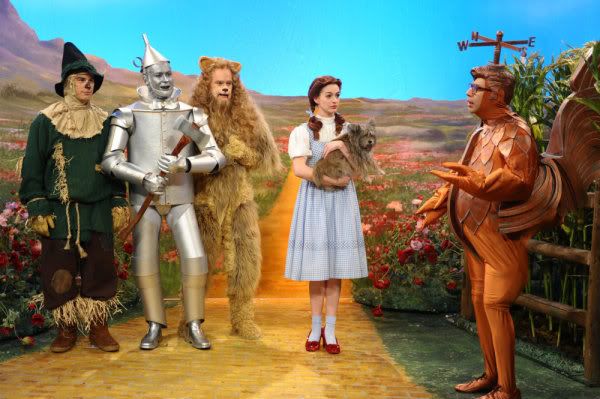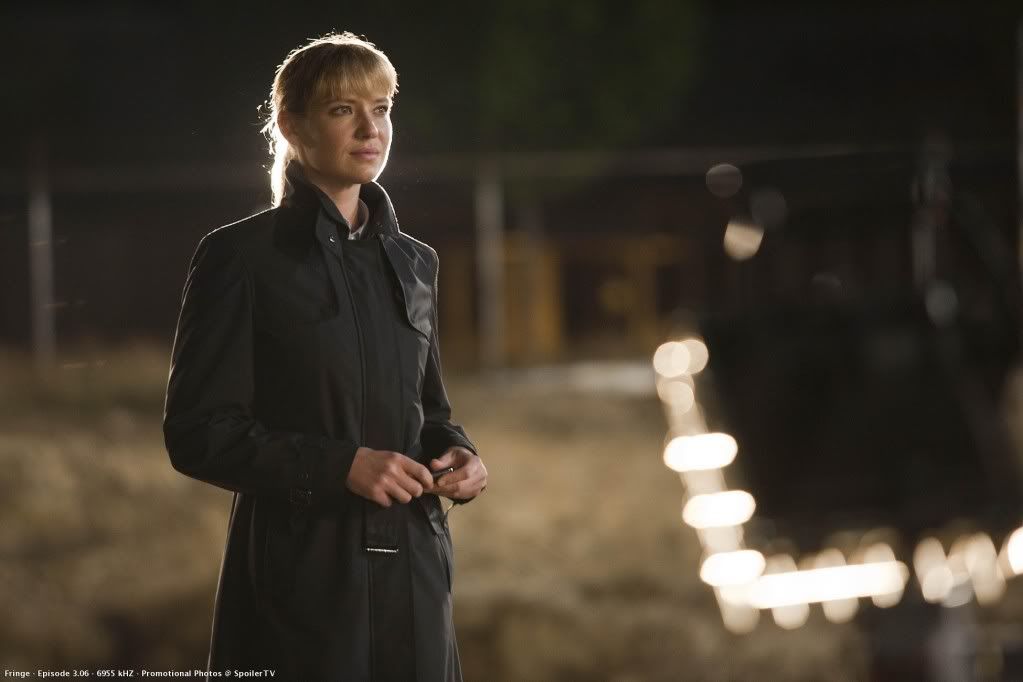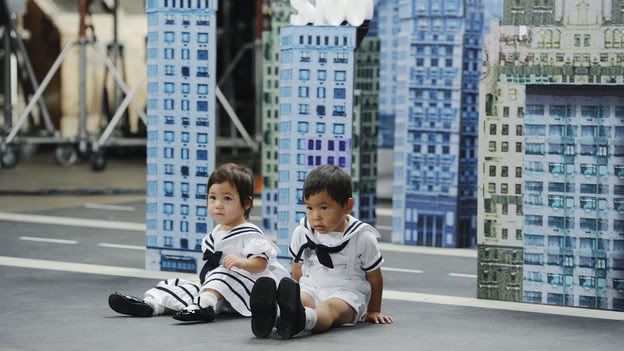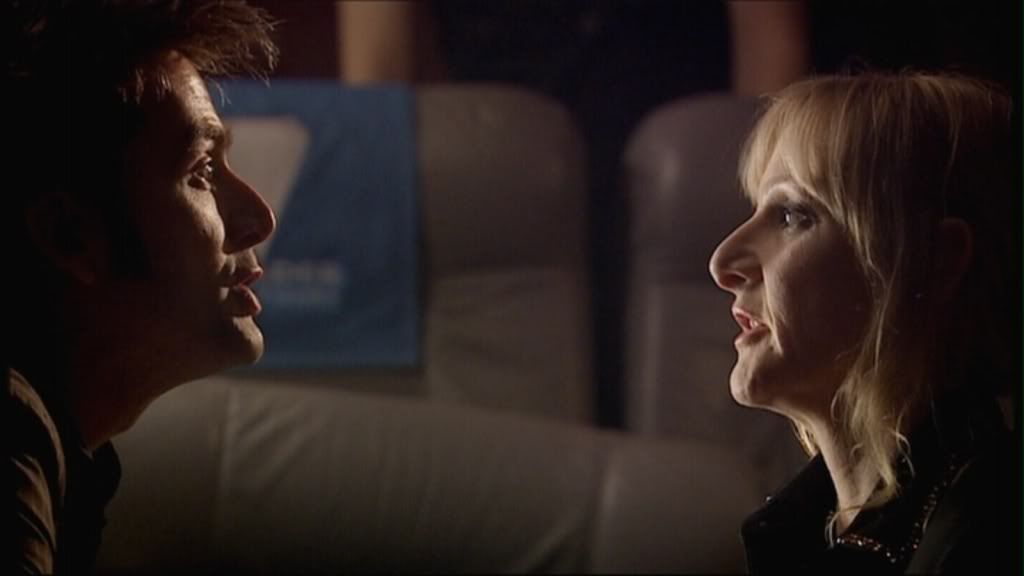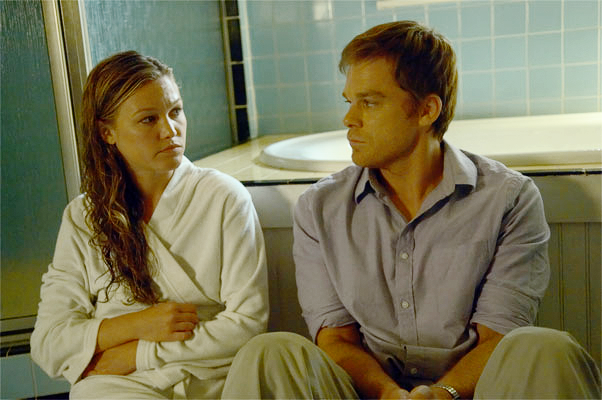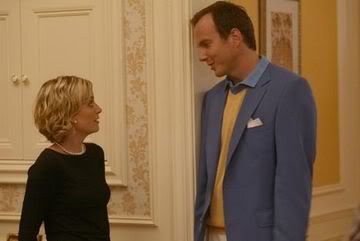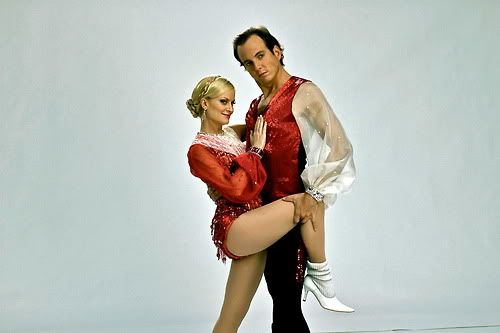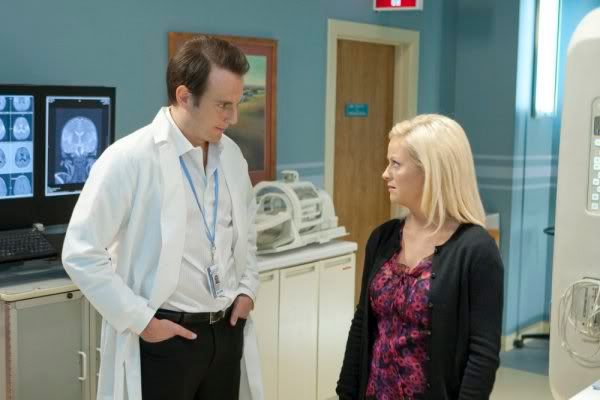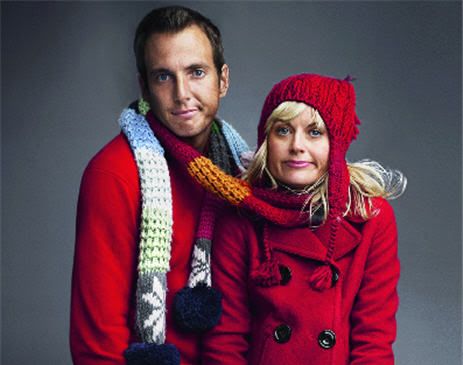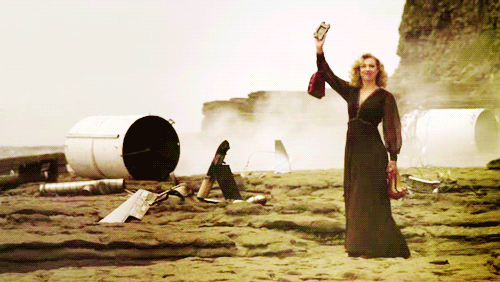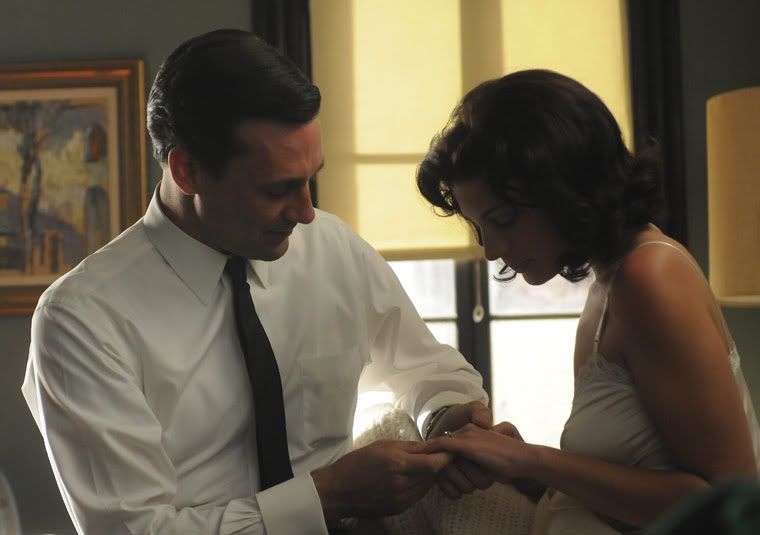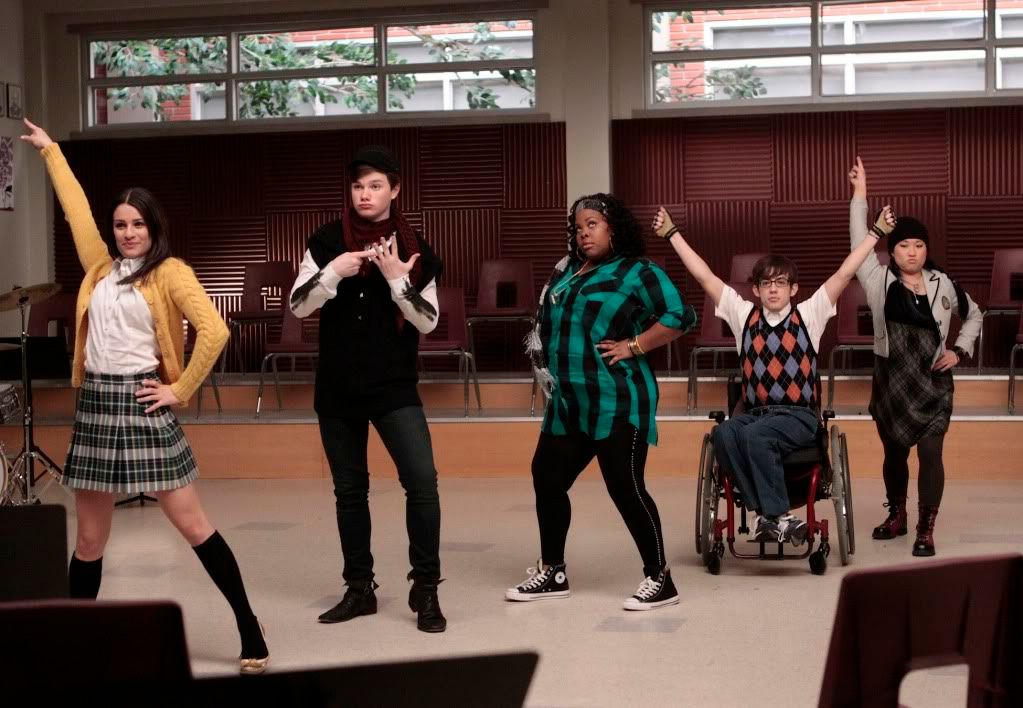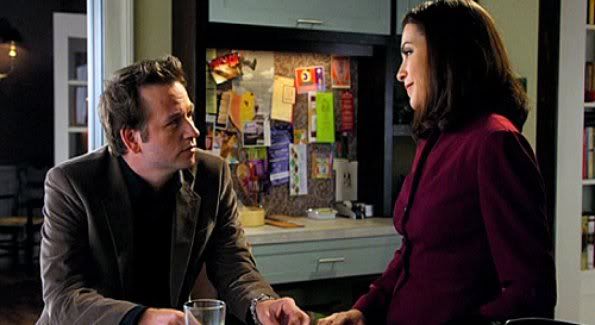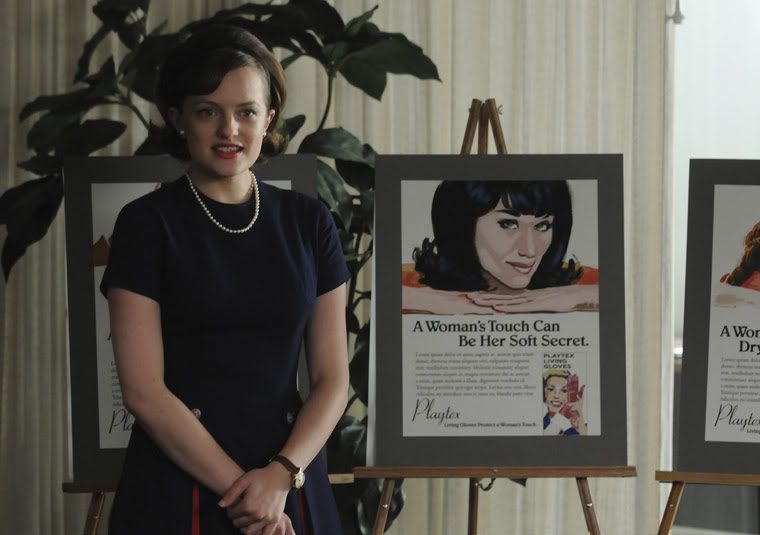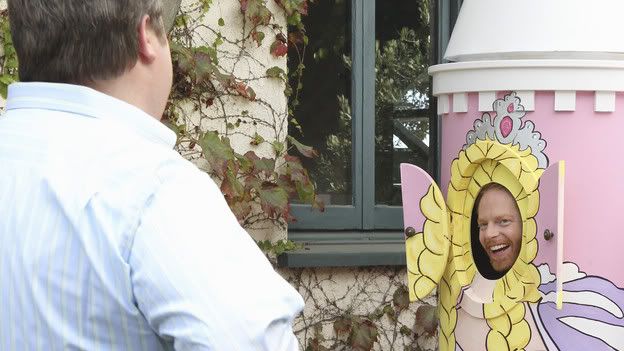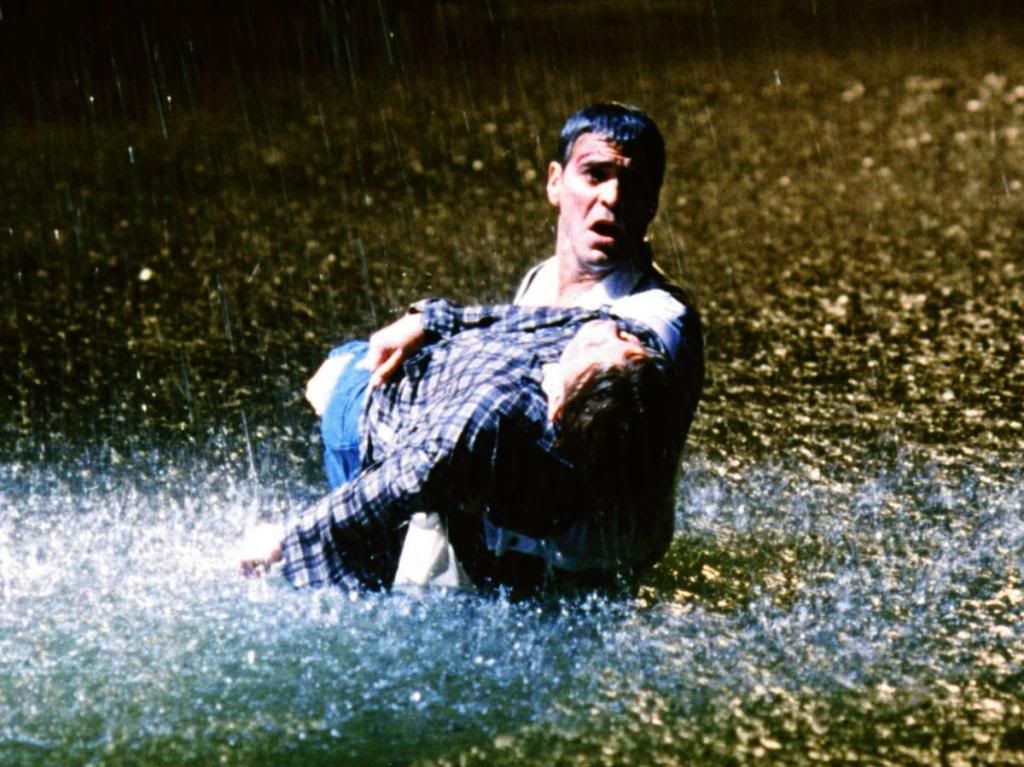Friday, 31 December 2010
Hey guys, all pages now consolidated at theoncominghope.blogspot.com. Come on by!
Friday, 3 December 2010
On the Pursuit of Excellence
The press has long been obsessed with documenting the downfall of achievers, whether the achievements are academic, athletic, cultural or even pop-cultural. For me, there is no high greater joy than watching someone perform at the top of their game (which is a little bit ironic, given that I can't stand to watch any sports of any kind).
Anne Hathaway's performance on Saturday Night Live last week was one of those moments where you watch and you feel a little bit transcendent. She sings! she dances! she is HYSTERICALLY FUNNY! I know some reviewers have said that part of the reason the episode worked was that the writing was far superior than the rest of the season, which may be true, but she was so good that even the lesser sketches didn't seem to drag on.
Like her superbly ridiculous rendition of Obscene Mary Poppins last time she hosted, her impressions this time managed to get straight to the heart of the innocent victims, whether it be Katie Holmes (how the hell did she do the upside down eyes?), Kate Middleton, or in my favorite sketch, Alanis Morissette.
Part of the joy in finding out what a great comedienne she is comes from the fact that she also managed one of my favorite dramatic performances in Rachel Getting Married, and her two minutes in Brokeback Mountain were chilling.
So when they announced that she was hosting the Oscars, I just thought, what a FANTASTIC fit! She has more range than any host of the past few years (except perhaps Hugh Jackman, who was a joy to watch). So the combination with James Franco promises a more unpredictable, energetic and fun awards show than they've had in years (even though I still think that hardly any movies released this year so far have been awards-calibre).
Saturday, 13 November 2010
Fringe: "6995 kHz" or "FauxLivia has Pronoun Trouble"
I cannot begin to explain how simultaneously exciting and frustrating it is to see Fringe on schedule now (there's no way to spoil myself, and I get the pleasure of being shocked by each new revelation). BUT WHY ISN'T NEXT WEEK HERE ALREADY?!?
OLIVIA/BOLIVIA/FAUXLIVIA
One of the things that makes Fringe great is that the way the story has developed, minute character developments can be just as mindblowing as big reveals like the Twin Towers in the parallel universe. We watch Fauxlivia closely for any betrayal of her true identity. We watch, desperate for any character to show a glimmer of recognition that Fauxlivia is not Ourlivia. Part of the reason this storyline works in this show, when it has failed so completely in other shows, is that it is not completely obvious that it's the wrong Olivia. There are slight moments when she's a little 'off,' but that's it. We know it's not her, but we can't really fault any of the other characters for not knowing, owing to Anna Torv's fantastic parsing of the two Olivias.
We can't fault poor hapless Peter, who's obviously blinded by romance. We can't fault Walter, for obvious reasons. Astrid only ever dealt with Olivia on a professional level, so it's not surprising that she doesn't detect the nuances. But Nina. Oh Nina. She is the first to really cotton on that something's not right, which makes perfect sense. She and Olivia have always had an adversarial relationship, and so she has probably studied Olivia extensively to understand how to manipulate her. And Olivia has never been as forthcoming to Nina as Fauxlivia was in this episode, so that probably sent up some kind of flag. While it's slightly surprising that she didn't say anything during her heart-to-heart with Walter, we all know that Nina plays things close to the vest.
(Unless of course, as other commenters have suggested, there's a massive long con going on where Walter, Nina and Peter already know that it's the wrong Olivia, but that's too convoluted even for this show.)
THE ACTUAL EPISODE
The only way to get through the opening scene is to pretend it's Ourlivia, which makes it cute and fun, otherwise the whole thing is pretty squicky. But it is sweet, and mercifully short. I like that Fringe doesn't dwell too much on melodrama, instead using emotional moments for short and sweet effect, rather than using character drama as a substitute for a plot (cough cough LOST!)
There was a lot happening this episode (I am very grateful to Fringe that it advances the plot every episode, and doesn't treat it's mythology as the be-all and end-all of the entire show, unlike that other J.J. Abrams show). This episode gave us the first hints about how this particular storyline might resolve: Fauxlivia shows the first sign of hesitation about whether her mission is actually the righteous one. Between Nina, Walter and Peter, we learn about a key difference between Earth Prime and Alt-Earth: hope still exists in Earth One. Science can be used as a tool to help humanity, and not just for destruction. We get the sense throughout that Fauxlivia has only been exposed to science as a tool for military dominance, for keeping society in check, not as a constructive device in its own right. So when Peter tells her, Doctor-style, "There's got to be another way," you can see her almost start to believe it.
FauxLivia breaks cover on three separate occasions in this episode, each one not enough to blow it completely, but hopefully are sufficient to create a few scratches on her facade. The first is what I mentioned earlier, that she won't confront Walter directly, but asks Nina to do so instead. We all know Olivia is ridiculously brusque with Walter when he gets goopy (hence in Alt-Verse, all she has to do to prove that she's Ourlivia is yell at him, hilariously.) The next two are with silly Peter: first, she doesn't remember Ed Markham, midget bookseller extraordinaire. Then, more obviously, she betrays the fact that she doesn't have Olivia's photographic memory, when she struggles to recall the fateful numbers of Lost (sending me into shuddery flashbacks of hatred of Lost).
This episode also introduced an exciting new element: the First People, a race of humans that theoretically existed before even the dinosaurs. According to the only source, one Seamus Wiles, they were far more technologically advanced than modern man, and thusly proceeded to wipe themselves from the face of the universe. Also, most importantly, and I take absolutely no credit for noticing this, but ANAGRAM AHOY! Seamus Wiles = Samuel Weiss, who you will recall as being 'older than you think.' Before someone cracked that anagram, I assumed that the First People are one and the same as The Observers, but now I don't think so.
Finally, we get a tantalizing coda in the Alt-Verse, where we learn that Olivia is in imminent danger. And then I yelled at the tv for ending the episode. Cause shit be goin' down next week.
FUN STUFF
Walter and Nina, sitting on a bench, sharing a joint and lamenting 'kids these days.' It was a wonderfully warm scene with two characters we wouldn't normally associate with warmth.
Astrid actually has a role! And that role is channeling Alt-Strid and being a numbers whiz (seriously is there anything this girl isn't an expert in?) Sudden increase in screentime = red-shirt alert...
OLIVIA/BOLIVIA/FAUXLIVIA
One of the things that makes Fringe great is that the way the story has developed, minute character developments can be just as mindblowing as big reveals like the Twin Towers in the parallel universe. We watch Fauxlivia closely for any betrayal of her true identity. We watch, desperate for any character to show a glimmer of recognition that Fauxlivia is not Ourlivia. Part of the reason this storyline works in this show, when it has failed so completely in other shows, is that it is not completely obvious that it's the wrong Olivia. There are slight moments when she's a little 'off,' but that's it. We know it's not her, but we can't really fault any of the other characters for not knowing, owing to Anna Torv's fantastic parsing of the two Olivias.
We can't fault poor hapless Peter, who's obviously blinded by romance. We can't fault Walter, for obvious reasons. Astrid only ever dealt with Olivia on a professional level, so it's not surprising that she doesn't detect the nuances. But Nina. Oh Nina. She is the first to really cotton on that something's not right, which makes perfect sense. She and Olivia have always had an adversarial relationship, and so she has probably studied Olivia extensively to understand how to manipulate her. And Olivia has never been as forthcoming to Nina as Fauxlivia was in this episode, so that probably sent up some kind of flag. While it's slightly surprising that she didn't say anything during her heart-to-heart with Walter, we all know that Nina plays things close to the vest.
(Unless of course, as other commenters have suggested, there's a massive long con going on where Walter, Nina and Peter already know that it's the wrong Olivia, but that's too convoluted even for this show.)
THE ACTUAL EPISODE
The only way to get through the opening scene is to pretend it's Ourlivia, which makes it cute and fun, otherwise the whole thing is pretty squicky. But it is sweet, and mercifully short. I like that Fringe doesn't dwell too much on melodrama, instead using emotional moments for short and sweet effect, rather than using character drama as a substitute for a plot (cough cough LOST!)
There was a lot happening this episode (I am very grateful to Fringe that it advances the plot every episode, and doesn't treat it's mythology as the be-all and end-all of the entire show, unlike that other J.J. Abrams show). This episode gave us the first hints about how this particular storyline might resolve: Fauxlivia shows the first sign of hesitation about whether her mission is actually the righteous one. Between Nina, Walter and Peter, we learn about a key difference between Earth Prime and Alt-Earth: hope still exists in Earth One. Science can be used as a tool to help humanity, and not just for destruction. We get the sense throughout that Fauxlivia has only been exposed to science as a tool for military dominance, for keeping society in check, not as a constructive device in its own right. So when Peter tells her, Doctor-style, "There's got to be another way," you can see her almost start to believe it.
FauxLivia breaks cover on three separate occasions in this episode, each one not enough to blow it completely, but hopefully are sufficient to create a few scratches on her facade. The first is what I mentioned earlier, that she won't confront Walter directly, but asks Nina to do so instead. We all know Olivia is ridiculously brusque with Walter when he gets goopy (hence in Alt-Verse, all she has to do to prove that she's Ourlivia is yell at him, hilariously.) The next two are with silly Peter: first, she doesn't remember Ed Markham, midget bookseller extraordinaire. Then, more obviously, she betrays the fact that she doesn't have Olivia's photographic memory, when she struggles to recall the fateful numbers of Lost (sending me into shuddery flashbacks of hatred of Lost).
This episode also introduced an exciting new element: the First People, a race of humans that theoretically existed before even the dinosaurs. According to the only source, one Seamus Wiles, they were far more technologically advanced than modern man, and thusly proceeded to wipe themselves from the face of the universe. Also, most importantly, and I take absolutely no credit for noticing this, but ANAGRAM AHOY! Seamus Wiles = Samuel Weiss, who you will recall as being 'older than you think.' Before someone cracked that anagram, I assumed that the First People are one and the same as The Observers, but now I don't think so.
Finally, we get a tantalizing coda in the Alt-Verse, where we learn that Olivia is in imminent danger. And then I yelled at the tv for ending the episode. Cause shit be goin' down next week.
FUN STUFF
Walter and Nina, sitting on a bench, sharing a joint and lamenting 'kids these days.' It was a wonderfully warm scene with two characters we wouldn't normally associate with warmth.
Astrid actually has a role! And that role is channeling Alt-Strid and being a numbers whiz (seriously is there anything this girl isn't an expert in?) Sudden increase in screentime = red-shirt alert...
Thursday, 11 November 2010
On The Viewing Habits of Political Parties
I really don't know what to say about this list. On the whole I'd like to say it means Democrats have better taste, but there's that #3, Kourtney and Khloe Take Miami. As Lucille Bluth once said, "I don't know what it is, and I certainly won't respond to it."
It's encouraging though that Modern Family is so popular on the Republican side, it's a great show for many reasons, not least of which that it normalizes the idea of gay marriage. Though the whole thing is a bit disingenous, as the company that ran the survey admitted that shows like The Good Wife and Modern Family are equally popular on both sides, which is absolutely not reflected in their little chart.
It's encouraging though that Modern Family is so popular on the Republican side, it's a great show for many reasons, not least of which that it normalizes the idea of gay marriage. Though the whole thing is a bit disingenous, as the company that ran the survey admitted that shows like The Good Wife and Modern Family are equally popular on both sides, which is absolutely not reflected in their little chart.
Friday, 5 November 2010
Extreme Show Catch-Up: Fringe
RANDOM DISORGANIZED BELOVED THINGS ON FRINGE SO FAR (mid Season 2):
-Walter and his friendship with Astral/Asteroid/Asterix. His inability to remember Astrid's name despite his obvious affection for her makes me giggle everytime. My all-time favorite misnomer though is Ostrich.
-The whole concept of the Observers is so Classic Who that it makes me squiggle with glee. Mystery creatures living outside of time. The Observer-centric episode is definitely my favorite episode so far.
-The organic development of the Bishops' Father-Son relationship. There's something very deep (in Walter's case, so deep that there must be something supernatural involved) driving their love for each other, and that shows in every single scene; it's not like other shows that rely on cheap sentimental plot points to develop family relationships.
-Anna Torv's acting: I know some people think it's absolutely terrible, but the weird awkwardness as Olivia makes the character interesting and fun to watch despite the fact that THE WRITERS REFUSE TO DEVELOP HER BACKSTORY OR FRONT-STORY (though I hear this changes dramatically toward the end of the season).
-Most shows, especially genre shows, expand their main cast in the second season. Fringe seems to have taken the opposite route, where everyone's a red shirt apart from our Fringe team and Lance Reddick (I'm sorry, I have to refer to him by the actor's name. I don't know the character's first name, and I can't keep typing 'Broyles.' Seriously, it drives me nuts: "We gotta tell Broyles." "We need Broyles's permission." The only way I will get over this is if there's an episode where Broyles invites the gang over for BBQ in a very special episode called 'Broyles Broils'.)
-LEONARD NIMOY!!
-Mainly, I like the fact that the show is well and truly science fiction, complete with wibbley-wobbleys and timey-wimeys.
-Walter. Period. Has there ever been a more entertaining character on television? And it's even better as we learn, more and more, that he really used to be a quasi-evil bastard with no regard for ethics or the good of humanity; it's all about him and his science. So it's simultaneously saddening and heartening that that kind of misbehavior is rewarded with complete madness, reducing Walter to an almost doddering fool (with an insane hankering for processed foods). Ironically, the more that Walter's sanity returns to him, with accompanying guilt, the more we learn about how twisted he truly was.
Thursday, 4 November 2010
Modern Family: "Chirp"
While I know that "Chirp" wasn't the funniest episode the show's produced, it's one of the most unique episodes. Like "The Dinner Party," the best episode of The Office, it lets the comedy develop out of quite serious dramatic issues which are clearly on the edge of blowing up.
Having now seen Ty Burrell outside of a purely comedic role (as Diane Arbus's put upon husband in Fur), I've realized that part of what makes Phil Dunphy so effective as a comic character is the slight sadness that always seems to be hanging behind his eyes, a bit like Charlie Chaplin or Madeline Kahn. As a result we never completely write Phil off as a complete doofus. And like last week, except more subtly this time around, we see Phil's silliness driven by very normal insecurities (not the sort of la-la dreamland ones that Michael Scott is often plagued with in lesser episodes of The Office). His existing fears are only amplified by the fact that not only is he failing at his own job, but he's failing at doing Claire's job while she's sick.
As for the Pritchetts, we get to see Gloria being hilarious as usual (she really has become the scene-stealer in a show full of scene-stealers).
And as for the gays, it starts off as a usual parental disagreement: Cam wants to be a showbiz dad, and Mitchell absolutely does not. But Cam sneakily gets Lily into a commercial anyway, and while this could go into predictable Cam and Mitch fight and then make up territory, it takes a left turn into...RACISM YAY RACISM. As it turns out, Lily was only cast to be one of two Japanese twins fighting off a monster that can only be described as Foreclosure-Zilla (straight out of Arrested Development). So blah blah, Cam makes a big speech about the nature of stereotypes to the director of the commercial, and then, in a twist that's too funny to imagine, HE TAKES THE WRONG BABY. Because all Asians look alike.
Now I know I didn't write about last week's episode (which I really should have, it was too hilarious for words. Especially when Gloria talks in an "American Accent"), which was one of the show's comedic high points. But this episode showed how strong the cast is, that they can do a little bit of drama just as well as anything else.
Chirp chirp!
Monday, 1 November 2010
Best Doctor Who Episodes for Newbies
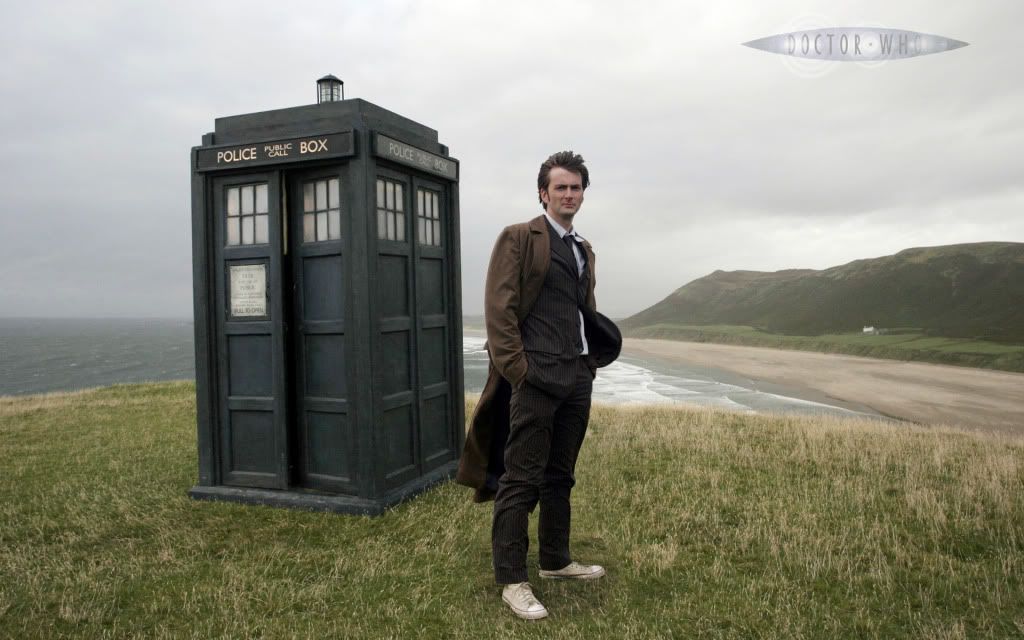 | |
| Doctor/Tardis = OTP |
The internet is chock-a-block with top ten lists of Doctor Who episodes, ranging from "best monsters" to "best use of glasses-porn" to "best cases of the Doctor licking things". But I am a longstanding fan, and I've had a lot of friends, particularly in the US, comment that they've seen and loved Torchwood: Children of Earth, and want to get into the mothershow, but find it completely intimidating to sift through.
So this is my attempt to create a sort of handy guide to the best episodes from the new series for people who have never seen the show. There's a combination of episodes that are there for pure quality and episodes that best introduce the broader mythology of Doctor Who. And even if you never watch another episode of Doctor Who apart from these, you'll know what people are generally referring to, and you'll think the show is bloody brilliant (There are a number of absolutely terrible episodes that make even me embarrassed to watch the show. I am, however, keeping you clear from the really really naff stuff that producers still feel compelled to put in the new series.)
Fair warning: the "Place in the Mythology" subheadings will more than likely contain spoilers.
GIRL IN THE FIREPLACE
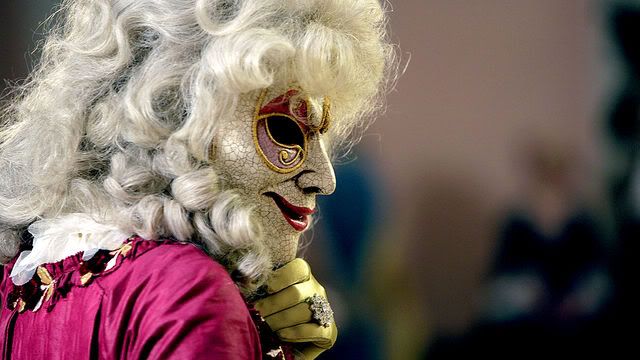 |
| "The clock on the mantle is broken, it is time! Doctor, it is time!" |
For fans of: The Time Traveler's Wife, steampunk, generally beautiful things
Best for: melding history and science fiction together seamlessly
The Story:
Louis XIV's court at Versailles is under attack from sinister alien robots. Louis' lover, Madame de Pompadour, contacts the only man who can help, the mysterious 'fireplace man' that saved her from the same robots when she was a child. The Doctor, who has crossed her fireplace into her boudoir multiple times, answers her call and leaves Rose and Mickey stranded in the 51st century. Who are the robots, and why are they so obsessed with Madame de Pompadour?
Why You Should Watch It:
Casting the impeccably good-looking David Tennant led to a lot of speculation that the Doctor would suddenly become a time-traveling Kirk. And yet, this is the first real romance we see on the show. Madame de Pompadour takes the term 'companion' to its logical conclusion (Aside: Joss Whedon did an interview long, long ago, about why he named the prostitutes on Firefly 'companions' - apparently he got irritated with the subservient, genderless and formless role of companions in classic Who, and wanted to subvert it).
There's no sex in Doctor Who that isn't deeply disguised (at least not until the current Moffatt era), but this episode is the closest we get to a true love affair, and not just with anyone, but with the favoured courtesan of Louis XIV.
Place in the Mythology:
This is a purely standalone episode, it has no link to anything that happens before or after. And yet, it tells us, and his companion at the time, so much about the Doctor, who he is, what he's fighting internally, and what really drives him. He will always save someone in need, even if that means leaving others even MORE at need. He is quick to fall in love, but falling is the furthest he can go. When he gets caught up in the pure joy of some of his adventures, he forgets some of the human costs. Until he doesn't. And that's when you can almost see it in his eyes, a piece of his heart ripped out everytime. Which makes you wonder if eventually, he doesn't let it be ripped out anymore (and in the case of David Tennant's Doctor, this definitely happens at the end of his tenure).
GRIDLOCK
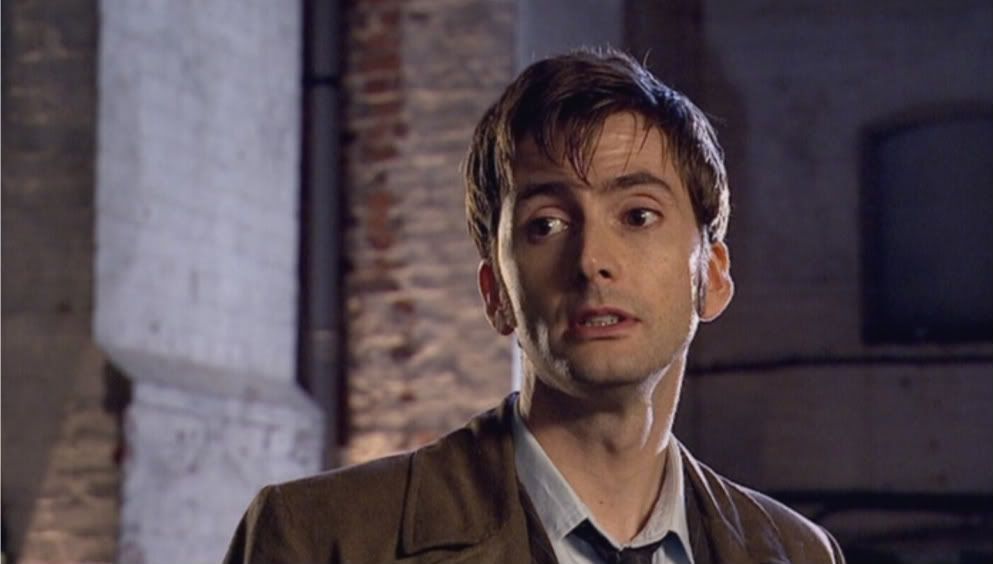 |
| "Everything has its time. And everything ends." |
For fans of: J.G. Ballard, Philip K. Dick, hard sci-fi
Best for: learning why the Doctor has moments where he seems to be suddenly shrouded in darkness.
The Story:
The Doctor takes Martha Jones to Earth's future as a reward for saving his life. When they get there, they find millions of people stuck, quite literally, in traffic gridlock. As the Doctor works to find out what's keeping humanity trapped in their vehicles underground, he meets a rogue's galleries of anthropomorphic cats and squabbling old lesbians. And once he finds out what's at the end of the tunnel, he'll never be the same.
Why You Should Watch It:
It's one of the only new Doctor Who episodes that has a pure sci-fi premise; most Who episodes are more in the "fantasy with future technology" realm. More importantly, we get to see the Doctor open up completely about his past, about his people, about everything he's lost in an honest, emotional way without disaster knocking on the door.
Place in the Mythology:
It has a villain from the old series that even I am not aware of (there are years of episodes that were burned by the BBC during a writers' strike, and are lost to posterity). We get an info-dump about the Doctor's home planet, which establishes the mythology of the new show. Most importantly, we find out what happens to Captain Jack Harkness, esteemed hero of Torchwood (though we won't find out exactly what until much, much later).
SILENCE IN THE LIBRARY/FOREST OF THE DEAD
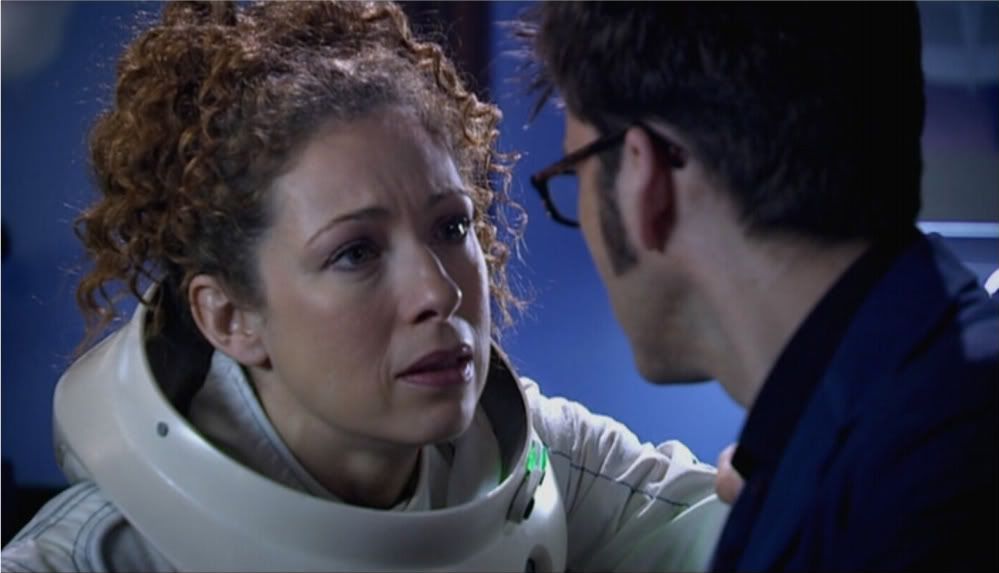 |
| "The Doctor...in the Tardis...next stop everywhere..." |
For fans of: Alien, complicated time travel stories
Best for: Seeing the Doctor evolve before your very eyes.
The Story:
The Doctor receives a message from someone claiming to be a friend, drawing him to what was once the biggest library in the universe. However, when he arrives, he finds that all the patrons had disappeared one hundred years ago, leaving an ominous message to 'count the shadows.' The Doctor is left to solve a number of mysteries: what happened to everyone, what exactly are the flesh-consuming shadows, and most importantly, who is River Song?
Why you should watch it:
It's brilliant, for a start. It's set in a library that has spoilers for everything that ever happens. It's genuinely terrifying in places, both emotionally and physically. It's clever and complicated in a way that longtime fans would not have expected from Doctor Who, and it has an ending that Neil Gaiman would be proud to have written (in fact he has said something to that effect). Nothing happens as predictably as you'd expect. Entire lifetimes come and go, without any magical potion.
It's one of the rare Doctor Who episodes that doesn't undermine the depth and darkness of its story with a cheap happy ending. In fact, even though you're rooting for the Doctor's plan every step of the way, there's a coda that makes you really question whether he saved the day at all.
To say anything more would spoil the experience. This is one of the few episodes that really had me guessing every step of the way.
Also, it has a terrific soundtrack.
Place in the Mythology:
Silence In The Library introduces firecracker archaeologist River Song, who has since become key to the mythology of the series. But owing to the non-linear nature of her story, how and why she's so important remains a mystery.
For the first and probably only time, we see the Doctor genuinely on the back foot, as he struggles with the idea of this woman who will one day be deeply connected to him, and knows more about him than he knows himself. It's particularly touching because we know that David Tennant's Doctor has too much baggage, so much heartbreak and angst, that he couldn't possibly be so at ease with another (human? Timelord? god knows), but you can see the glimmer of hope in his eyes (and the snap of his fingers) when River convinces him that one day that will change.
And I haven't even mentioned Donna's story. Oh god the heartbreak.
DALEK
 |
| "The stuff of nightmares reduced to an exhibit...I'm getting old." |
For fans of: Buffy/Angel (though more Angel)
Best for: introducing the Doctor's tortured past.
The Story:
In the far future, under the harsh Utah desert, billionaire Henry Van Statten maintains a collection of all the alien detritus that has every arrived on earth, including the last of the Dalek kind. As the Daleks destroyed all of the Doctor's people except himself, what will happen in this face-off between the last of the two ancient and mighty species?
Why You Should Watch It:
The Daleks are historically the Doctor's greatest enemy, a bunch of technologically superior neo-fascists. They are the villains that turned the show from a curiosity into must-watch television back in the 1960s, and were generally pretty scary (until all manner of silliness occurred, which the new series is bent on repeating). There's an excellent moment in the original series where the Doctor has the opportunity to stop the Daleks from ever being created, and his failure to act led to countless deaths and extreme devastation later on.
So seeing the Doctor face off one-on-one with the last of the Dalek kind, just as he is the last of his kind, has a beautiful poignance. There is an even lovelier moment in the resolution of the episode which questions the whole nature of predetermination, of revenge, and of forgiveness.
It's important to see this because it is the only Christopher Eccleston episode that has stood the test of time, which is unfortunate because his version of the Doctor really is one of the best but the writers gave him the worst story-lines of the series. Ever. Farting aliens were involved in not one, but THREE episodes.
Place in the Mythology:
Let's face it, where the Daleks are concerned, there is no such thing as mythology, past events, total elimination, or any logical narrative sense. They became too popular so they were hideously overused by pretty much every Doctor Who producer ever. But Dalek aired before the writers managed to ruin the overgrown pepperpots completely (again!).
BLINK
 |
| "The Angels have the phone box...it's my favorite! I've got it on t-shirt." |
For fans of: Greek Mythology
Best for: a beautiful tale of how people on the periphery are affected by the wars of the 'gods'
The Story:
When visiting an old house, Sally Sparrow finds a number of cryptic messages from a man called "The Doctor." Then, when her best friend disappears, she starts to take the the mysterious warnings more seriously. She follows a trail of breadcrumbs spread throughout time, but still doesn't know what to do, except for one piece of advice from the Doctor: 'Whatever you do, don't blink.'
Why You Should Watch It:
In this case it might be fair to confuse causation with correlation; the following year, Carey Mulligan had an Oscar nomination. The episode has the Doctor in it for a very brief time, which perhaps makes it an odd choice for the best intro episode. But Mulligan really sells it as winsome Sally Sparrow, drawn into time travel shenanigans purely by accident.
Again, the balance is pitch perfect between humor and horror, and there are actually moments where I jumped out of my skin. To this day, my grandmother can't look at a statue without a twinge of fear. The beauty of the whole thing is the nature of the threat - when you close your eyes, inanimate objects move to steal your life.
The fact that the Doctor appears so little in the episode, and often only in slight clues or cryptic messages, means that the viewer gets to really understand his approach to and relationship with being a hero; more often than not, he's in the wrong place at the wrong time, but he'll fix the problem, and damn the collateral damage.
Place in the Mythology:
We meet the best modern villains on the show, the Weeping Angels. Part of the beauty of this episode, though, is it's standalone nature; we are privy to an episode of Sally Sparrow's life, not to the Doctor's, which makes a change. We get the start and the finish of her time with the Doctor, which has a closure that few other companions get. (There were numerous rumours that they were going to bring her back full time, but then the Academy rang.)
HUMAN NATURE/FAMILY OF BLOOD
 |
| "He's like fire and ice and rage. He's like the night and the storm in the heart of the sun...And he's wonderful" |
For fans of: Neil Gaiman, especially the darker bits of Sandman.
Best for: Letting the companion shine, seeing what happens if the Doctor is not really the Doctor...
The Story:
In England just before WWI, a teacher named John Smith starts to have strange dreams of travel to far off lands and impossible places. Meanwhile, Martha holds the only key to getting the Doctor back, which becomes increasingly urgent when a menacing family arrives from the stars. Unfortunately, that key is stolen by one of the students...
Why You Should See It:
It is desperately stressful to know that there is a fearsome threat in the town and being able to see a man who looks just like the Doctor but has hidden that side of himself away so completely. We see John Smith live the life the Doctor never can: uncomplicated, simple, committed. There's a great tension between this wonderful love story that we want to see work and our (and Martha's) desperate need to get the Doctor back.
Also, the ending is terrific. It goes to a dark place that the show never had before or since (though Neil Gaiman will hopefully correct that!). There's a Brothers Grimm fairy tale element, which leaves you wondering which part of the Doctor is actually subsumed when he shifts identities: the human or the omnipotent alien?
Place in the Mythology:
We are introduced to a magical plot device known as the "Chameleon Arch," which essentially rewrites every cell of a Timelord into a new species, even replacing real memories with false ones. The original Timelord "essence" is then stored in a key, which always seems to be an old-timey fob watch that the Timelord in questions recognizes, but never opens. The minute we learn about this, we know (though the Doctor doesn't figure it out quite yet), that there might be other Timelords scattered about the Universe, their identities subsumed into a new consciousness, which is how they've managed to survive when the rest of the species died.
Moving on:
Right then, I hope some of you find this helpful! There are a number of other episodes that I considered for this list, but writing this post is already ruining my entire life, so I'll leave you here.
But, if you need some immediate recommendations to follow on, here they are:
 |
| Fires of Pompeii |
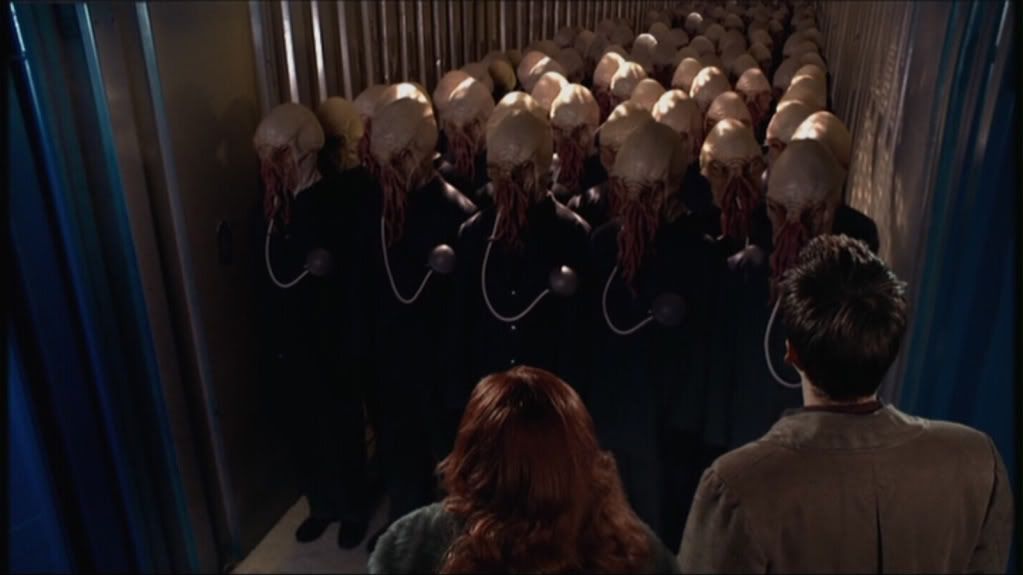 |
| Planet of the Ood |
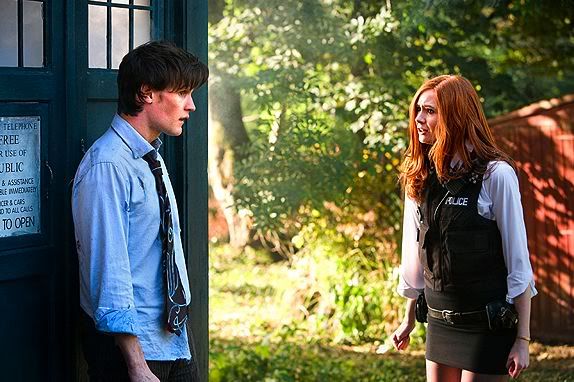
| ||
Dexter: Season So Far
I don't know why I haven't blogged about Dexter at all this season, I've really been loving it. This is the first season where I've started to watch it week after week and then continued (in the past I've gotten bored with waiting and then left it until I can watch the whole season in a weekend).
When the season started, I wasn't really sure what impact Rita's death would qualitatively have on Dexter's life. For one thing, I was concerned that the writers would dehumanize Dexter, turn him into a less disciplined, cold blooded killer. While he certainly has become less disciplined, Dexter has lost some of his bloodlust, which is a nice twist.
The second great decision the writers made was to get rid of Astor and Cody. While the bond between Dexter and Cody was one of the most heartwarming aspects of the show in the past, I don't think anyone wants to see Dexter deal with teen angst (and Astor had just become a pain in the ass by that point). The kids can still come back when necessary, but as the season moves along, the new connections Dexter has made more than make up for the loss of his past connections.
Which brings us to the third great thing about the show: Lumen. Julia Stiles plays her just right, with her pain and desperation barely concealed behind every move she makes; she's too damaged to be as calculated as Dexter of old, but ultimately she is looking for the same thing. But post-Rita Dexter has become less calculated as well, so at the moment they are kind of at the same level in their quests for meaning through revenge. It's nice for Dexter not to have to deal with a big bad evil superkiller, instead trying to help a vigilante in search of justice - a woman who is essentially Dexter on a small scale. She's such a kindred spirit that Dexter can't 'compartmentalize' her; at the end of the day, all he feels for her is compassion, real compassion, which is not something we've seen in Dexter before (at least not on this scale). I don't think I'd have a problem with a romance between the two, but I do hold a hope that they become partners in crime for seasons to come. A romance would lead to all sorts of complication from others in Dexter's life -
Which brings us to what does not work in the show: EVERYTHING NOT RELATED TO DEXTER. Until the end of last night's episode, Angel and Battista had reached a level of stupidity where the only appropriate response is the fast forward button. Quinn's 'bring down Dexter' thing is getting really old, really fast. It was annoying with Doakes, but we always understood the root of Doakes' suspicion and hatred of Dexter. What's Quinn's motivation really: that Dexter wouldn't watch a basketball game with him a year ago? Blech. Which is doubly annoying cause otherwise I would really buy the romance between Deb and Quinn if he weren't such a waffling turd.
But I look forward to what happens in the Dexter v. Lumen storyline, mainly because I can't predict where it's going, apart from lots of torture and blood, naturally.
Friday, 29 October 2010
Casting News of Extreme Joy!: Arnold Vosloo
Arnold Vosloo has been cast on Bones as "Evil Booth!" He'll play a rogue sniper in a 3 episode arc next Spring, according to Ausiello. Everyone who knows me knows I love both the Mummy movies (non Rachel Weisz movies don't count!), and one of the crowning joys is "Imhotep! Imhotep! Imhotep!". etc.
Saturday, 23 October 2010
Things That Make Me Happy: TV Couple Of The Day (Year?)
Something that gives me great joy every time I think about it is the fact that Amy Poehler and Will Arnett are married! (And have already produced 2 future comedy geniuses?)
Has there ever been another married couple who so frequently show up on each other's shows??
The photo that inspired this post:
Back when I was first introduced to the fact they were married (I tried to find the photo where she was committed Abu Ghraib on Gob, but screw you internet. And yes I am too lazy to screencap my DVD.):
As incestuous brother and sister on Blades of Glory:
When he creepily tried to MRI her on Parks and Recreation:
And just for funsies:
Has there ever been another married couple who so frequently show up on each other's shows??
The photo that inspired this post:
Back when I was first introduced to the fact they were married (I tried to find the photo where she was committed Abu Ghraib on Gob, but screw you internet. And yes I am too lazy to screencap my DVD.):
As incestuous brother and sister on Blades of Glory:
When he creepily tried to MRI her on Parks and Recreation:
And just for funsies:
Wednesday, 20 October 2010
Tuesday, 19 October 2010
Mad Men, Inked: Tomorrowland
Well, this week's episode set off a bunch of bombs, but nobody died (contrary to spoilers floating around the web).
We open with Emo-Don, lying in bed and whining to Faye about his life, his job, his clothes and probably his haircut. Faye tells him to man up, and knowing this show, that means we, the audience, are obliged to say only one thing: "Nice to know you, Faye!"
Moving on.
"Did you get cancer?" Roger shouts after Don's presentation to the American Cancer Society, offering the only reasonable explanation for Don's actions this episode. Don did not get cancer, but we finally got our first glimpse of the inner life of Ken Cosgrove. And just as Pete always sensed, we love Cosgrove more than him. More now.
Meanwhile, in Ossining's soon to be former-house-of-pain, Cruella-de-Betty piles cruelty upon cruelty on Glenn and poor Carla, after Glenn has the AUDACITY to say goodbye to Sally and promise to visit her when he's a horny teenager with a car.
48% capital gains!!! Enough said.
Owing to the recent firing of Carla, Don is suddenly faced with the prospect of taking care of his 3 kids on his own, and faster than he can say "Betty is a psycho-bitch," he employs Madame Secretaire to babysit his children and his penis (spoiler!) on their trip to Disneyland.
Meanwhile, Henry shouts at Betty, Betty shouts back, Henry slams the door, and Betty demonstrates, yet again, that she just wants to be Sally. Now physically, not just mentally.
Back in LA, Megan learns that a milkshake really can bring the boys to her yard, in one of the best scenes of the episode. The fact that she didn't yell at Sally was, in fact, all it took for Don to ask her to marry him (with an engagement ring from the REAL Don Draper). In response, we are treated to a new expression on Megan's face, roughly translated as "uh-oh this was way too easy and can't possibly end well." And then she accepts.
Back at the offices of S-DP, we see Peggy being awesome, as usual, while Harry Crane has become a smarmy lech that would not be out of place on I Love Lucy. Peggy wins the first new business since the Lucky Strike disaster, and is appropriately miffed that Don's engagement seems to take precedence as 'hot news.'
Everyone's reaction to the news:
Lane: "I don't know what's going on here, and I don't care, but congratulations."
Roger: "I'm so proud of you!"
Pete: "May flowers rain upon your golden years."
Peggy: (Head cocked, Arrested Development style) "Her?"
Ken: "I just work here. This isn't my life. My life is my future wife. Shit, Don, your future wife works here. Follow my reasoning?"
Joan: "What a cliche."
Faye: "What a waste of time and character development."
Betty: "Maybe now that you're marrying someone else, I can be your mistress?"
Final note: How come both Boardwalk Empire and Mad Men had the same odd, dumb line this week: when someone was not reachable for a while, the response is "I was starting to think you were ill or something." Quoi? Is that the first thing ANYONE thinks when someone goes incommunicado?
Thursday, 14 October 2010
Modern Family: "Strangers On A Treadmill"
 |
| How are these two so wussy with a dad like Jay? |
I'VE MADE A HUGE MISTAKE
I'll start with the one that didn't work, which sadly was the Jay-Gloria subplot, where Gloria gets him to attend the quinceanera of his employee's daughter. There was something about this that made me think about Arrested Development (probably the culture clash), cause I know how they would have set up the storyline and made it work. For one thing, Hurwitz et al would have started the story much later, probably when they're walking into the hall, rather than back in the house. We would have reached the awkward finale of the story much more quickly, and then we'd spend some time with Jay/Gloria trying to correct his faux-pas (and failing). Instead, we got too much exposition, in exchange for not enough payoff. It was just Michael Scott-level AWKWARD.
STRANGERS ON A TREADMILL
On the other end of the neighborhood, Claire and Mitchell team up to "Strangers On The Train" Phil and Cam, because they are both extreme cowards (though in the end, Mitchell even more so). Cameron has developed a charming new habit of wearing bicycle shorts in public (love the way the camera put censor pixels on the ENTIRE PAIR OF SHORTS everytime they were on screen. When Claire tells him to lose the shorts (after very transparently trying to butter him up), Cam runs to the bedroom and cries like a baby. Later, when he finds out Mitch was in on it, the end up in a detente that Mitch very cleverly wins.
Jay, on the other hand, is preparing a speech full of lame zingers for the annual real estate convention. Claire, with the best intentions, tries to scupper the whole thing, but Mitchell chickens out at the first sign of Jay's heartbreak. So Claire hides the speech and then Phil manages to kill anyway. Which led to a 'heartfelt' scene that actually felt earned, and didn't make me roll my eyes.
THE THIRTEENTH FLOOR
Now the writers have suddenly picked up on the fact that Alex and Haley are awesome, so now we get a FOURTH plot (but seams are already showing with the multiple stories, I hope they recalibrate soon). Once again, the girls give us one of the funniest scenes of the episodes, when Alex manages to out-popular Haley, until the whole thing explodes and they both start screaming.
And I was rolling on the floor laughing.
Why Glee and I Have Broken Up Permanently
Glee has gone from sharp and entertaining, to swinging wildly and occasionally striking, to actively horrifying me. There were a number of points last week when I was ready to break up, but then something great would happen and I would give it another chance. But the breaking point has come. Last week's Grilled Cheezus episode was the first that I turned off in the middle and had no desire to turn back on.
Glee has now been relegated to the reading of recaps on TWOP.
So what happened? What changed?
The first half of season one was brilliant. The show could have ended with the December episode, and it would be remembered for being a brilliant, entertaining and endearingly honest show about youth and fitting in. The songs weren't all mainstream shill, and they weren't used at the expense of plot.
That's the first thing that changed, when producers realized they could make millions from those damn tie-in soundtracks (I'll never forget one club that actually played the GLEE version of Don't Stop Believin' instead of the original). Suddenly our stars were leaping into song at every possible moment, and Sue Sylvester became a one woman joke factory for Will's lesbian hair (her words, not mine). And while the plot greatly suffered, the writers still had a fairly good grasp of their characters, of their desires, of the roots of their insecurities. (Except Will, who got more and more ridiculous).
The first episode that ACTIVELY PISSED ME OFF was when Finn temporarily moved in with Kurt. Kurt had been scheming and almost sexually harassing Finn for a number of episodes at that point, and yet when Finn finally loses it, Kurt is apparently the one with the moral high ground.
And that is the real turning point: when the show shifted from a tone of high camp, which made a lot of the character stupidity forgiveable, to a sort of self-seriousness that does not work at all when every one of your characters is a broad character. The show started to substitute random character traits for actual personality and depth (Sue has a mentally disabled sister, which explains...everything apparently?).
So then season two came along, and I was sucked in by all the summertime hype, enough to maybe give it a chance. But they did it. Three episodes, three writing decisions of absolute stupidity, and I was done.
1. Artie wants to be a football player. Finn helps him. Coach Beiste accepts. HOW MANY THINGS ARE WRONG HERE?!? First of all, what an awful, awful message to send to kids with any sort of developmental problems: you can literally do anything. You are born with a disadvantage, but that's ok, because CLEARLY EVERYONE WILL ALWAYS BEND OVER BACKWARD TO HELP YOU! Especially COMPETITIVE teams that want to WIN THINGS. And we had always been shown that Artie had quite well adapted to his disability, so now he wants to achieve the impossible? OFFENSIVE, SHOW!
2. The Britney episode. What an unqualified waste of time. There wasn't even the usual attempt to make the songs sort of relevant to the goings on in the teenager's lives, we were just treated to a bunch of SHOT-FOR-SHOT remakes of Britney music videos, which I tried so hard to avoid the first time around (as did so many). Why do these Broadway qualified singers need to be dumbing themselves down to sing the least musical songs in the world anyway? OFFENSIVE, SHOW!
3. The straw that broke the camel's back: singing 'religious songs' in a school sponsored activity. This is illegal, EVEN IN TEXAS. It's personally offensive to me both as a religious person, and as a defender of secular separation of church and state. The idea that someone found religion in a cheese sandwich is offensive and dumb (even for Finn), and that he would then force his new views on everyone else (and be allowed to do so in choir) is even more offensive. So well done on the double whammy, Glee, offending truly religious people and offending secularism and the legal principle of separation of church and state.
There are so many other things to carp on, but I've said my piece.
And just to be clear, Glee, it's not me. It's definitely you.
Wednesday, 13 October 2010
When Mad Men Meets Vocals
This is already going around the web, but I am happy to contribute to its spread.
A beautiful live mash-up of the Mad Men theme tune with Nat King Cole's "Nature Boy." It works perfectly, and is oddly affecting.
A beautiful live mash-up of the Mad Men theme tune with Nat King Cole's "Nature Boy." It works perfectly, and is oddly affecting.
Another week, another fantastic episode of The Good Wife. A little lighter on the heavy drama this time around, we got to see a softer side of Alicia, and a whole mess of hijinks with Eli Gold. In fact, both the family and work stories had a Looney Tunes vibe about them, especially Roadrunner and Coyote (thankfully no one was harmed. Except for the dead person. Christine Baranski said it, not I).
I'm pretty sure I would happily watch an hour of Eli doing spit takes at youtube videos trashing Peter. But in this episode, we the viewer are granted an embarrassment of hilarities, given Eli's tinpot schemes to get a wealthy political activist to favor Peter with his riches. At first he was worried that the donor was put off by Alicia's brother's offhand comment about Peter being uncomfortable around gays, but in truth the donor was worried that Peter was pro-Palestine.
Eli's solution? Have Yom Kippur at the Florrick house, with Alicia's brother taking the 'some of my best family are gay' seat. Peter's mother, as usual, treats us to a fine dessert of political incorrectness, while Grace nearly scuppers the whole thing by daring to bring up flotilla-gate. Every statement and misstep was perfectly timed, punctuated by Eli's ever-bugged out eyes at each new faux-pas. At one point I'm sure he sniffed in horror!
Over at the office, our resident game of spy vs. spy is heating up, as Kalinda and the new guy try to outdo each other at every turn! I have a feeling this competition is going to end very badly (or with really wild sex, and as it involves Kalinda, I'm predicting the latter).
Not too much Will or Diane this week, but I am really enjoying Alicia's new 'mentor.' He's much less showy than Will and Diane, and seems to be quietly awesome the way Alicia regularly is. Michael Ealy was one of the stronger links on Flashforward (god rest its soul, but really it didn't have too many strong links), and it's good to see him on a genuinely quality show.
I'm hoping to see a stronger continuous storyline in the office plots, like last year when they were facing the constant threat of bankruptcy. Peter's campaign, while providing fantastic individual scenes, hasn't really given me something to be emotionally invested in (unlessAlicia takes him back 100%, I'm not sure I really care about Peter's success). But I can't complain about the hijinks.
Tuesday, 12 October 2010
Mad Men, Inked: "Blowing Smoke"
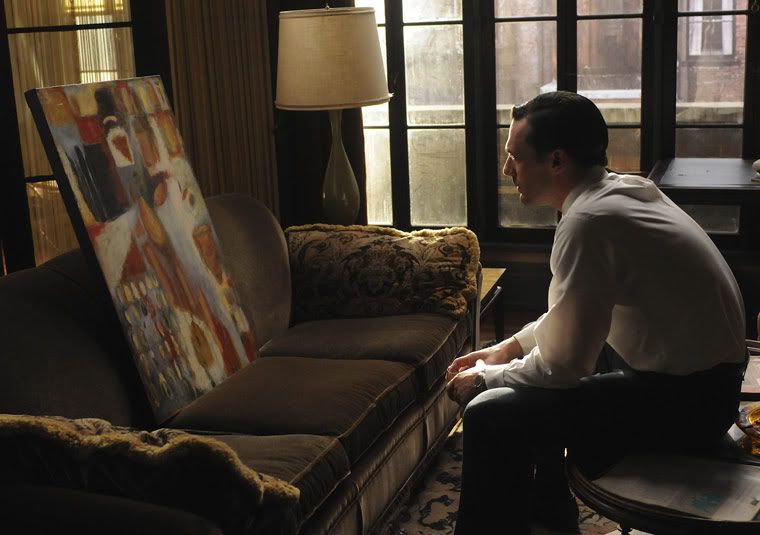 |
| Don Draper stares into the abyss of addiction... |
Here we go, the penultimate episode! This week, there was one key moment, the 'tentpole' of the episode, if you will, and everything else that happened built up to or receded from that moment (apart from the Sally Draper subplot, but we'll return to that - maybe - at the end.
THE KICKOFF
The Jenga Blocks are all in place, there's only a few left to be pulled out, and every move will either defer the inevitable or send the whole thing tumbling down. Don't first wrong move: trying to delay the inevitable. The new client pitches reeked of desperation, and the pitch receivers could smell potential failure all over the SCDP executives.
As a death pall settles over the office, the creative staff fear for their jobs, and senior staff are forced to contribute to an emergency collateral fund (which leads to a hilarious scene where we are reminded who actually wears the pants in the Campbell house).
Peggy, ever the voice of reason, objects to the new 'monkeys, go on playing with your typewriters, until of course you're fired' work mandate, and compels Don to do something - have dinner with an old flame (Hey it's Midge! We like Midge! She's fun and carefree! Oh and...now she's a heroin addict). Don pities her enough to buy one of her paintings, but she still plays it cool ("cash only darling, we don't accept checks in Casa de Hippie Syringe").
And so we cut to Don, staring into the eyes of the painting for what felt like ten minutes on screen.
THE POWER PLAY
This encounter with the dire desperation of addiction sends Don running for his livejournal, mainly to complain: "Dear Diary, all I want is to shout and drink, but who will I shout at and drink with if evil Lucky Strike and heroin take away all of my friends and servants?" That didn't actually happen, thank god (i was in great fear though, of more inane inner commentary from Don's AA journal).
Instead, we get a surprisingly well expressed (if altogether false) assertion that "Hey big tobacco, it's not me, it's you, and by the way here's a restraining order." What Don forgets to tell us is that this angry breakup letter will be released as a full page ad in the New York Times. Don also forgets to tell Sterling, Cooper, Pryce and Campbell, which has has the immediate effect of Bert collecting his shoes and quitting. Perhaps unsurprisingly, Don deals with individual hissyfits from all the men in the office (though really, what does Roger care anymore?). But they mostly come around when the American Cancer Society comes a-calling.
The women though? Surprisingly approving. Once again, we see Megan laying her honey trap, that she's 'the only one who really gets him', and also 'marry me!' Faye, disappointingly, does not freak out at him, which she would be entitled to given that SHE WAS FIRED FROM MULTIPLE ACCOUNTS AS A DIRECT RESULT OF DON'S AD. But she smells opportunity - date Don in the open - like she obviously smells a threat - the secretary with the googley eyes.
And of course Peggy approves, smiling at Don like it was all her idea in the first place (which it sort of was, but she was the catalyst, not the final architect of the power play).
THE OFFSCREEN FALLOUT
As one might expect, Don gets tons of calls as a result of his bombastic essay. Here are two notables:
Caller #1: Emerson Foote - not just a throwaway comment. He was a creative director who once handled American Tobacco and Lucky Strike, until he became disgusted with his addiction to cigarettes, quit McCann-Erickson, and started a new agency that would not represent tobacco.
Caller #2: "Bobby Kennedy" I'm sure that when Robert Kennedy called to speak with Don, I wasn't the only one to think "dear god, please don't let us hear him speak." But they ignored me, and we got that awful accent. Thankfully the whole thing was a gag by Ted Chow-ow-ow, which was pretty great given how well he fooled Don.
OTHER STUFF GOING ON
Back in the Ossining house of 'denial is not just a river in Egypt, it's a life philosophy,' we see Sally growing past Betty in the maturity race (which puts Betty at about 4 years old now? I'm not being unfair, Betty's the one who would rather see a child psychiatrist than a grown-up doctor). This story concludes with Betty proving, yet again, that solving her own 'problems' (really Betty? Moving to a new neighborhood to get away from a little boy?) is more important than her daughter's mental stability. I'm sure this won't come back to bite her AT ALL!
Thursday, 7 October 2010
Modern Family: Earthquakes Review
Despite having not one, not two, but THREE classic sitcom plots, this still managed to be one of the funniest episodes yet. One of the things that's great about Modern Family is that while it has the familiar situational comedy of old shows like The Dick Van Dyke Show, things always go in a slightly different direction than you'd expect.
And of course Modern Family has this kid:
"We're not gonna play Good Cop-Mom"
And now to run through the plots. First we have the Dunphy clan: Claire calls in a plumber for some irrelevant reason, and gets locked in the bathroom with said plumber after the earthquake. Unsurprisingly, it's MORE chaotic outside the bathroom, with Alex and Haley running around scheming, Phil trying to cover up his own stupidity, and Luke being, well, Luke. This plot had one of the most giggle worthy moments ever, when Alex interrupts a shouting match between Haley and Claire about being grounded. [I tried to transcribe it, but you just have to see it]. Alex is one of the funniest young characters on tv, now or ever. She's on par with my personal favorite, Maeby Funke. Although Luke had me on the floor with his "I got scared because the cabinet didn't fall down."
"It was the 90's, we'd just lost Princess Di"
My favorite plot this week was Cam-Mitchell's, as they use the earthquake as an excuse to get out of a party held by Pepper Saltzman (Nathan Lane, probably the only actor who's more capable of controlled camp than Eric Stonestreet). Dressed as Oscar Wilde and what appears to be one of the Von Trapp children, Cam and Mitchell concoct a plan, only for Cam to lie so badly that Pepper comes straight over. Nathan Lane was simply fantastic, far funnier than his role as Jack's dad on 30 Rock.
"Some things can't be forgotten. Do you know what menstruation is? Cause I do!"
Sad to report, this was my least favorite of the 3, not that it wasn't good. This fell a little more into predictably sitcom territory, with Manny interrogating Jay about the investigation of heaven, and whether God ever makes mistakes. (Mainly I think I was disappointed about the lack of Gloria). Even this was saved at the end, when Gloria accidentally scares him away from heaven permanently.
Concluding Thoughts
Overall, the show hasn't lost any of its humor, but I tend to think that every time they do an episode where the stories lines don't actually overlap, one of the plots always suffers (maybe it's intentional, to allow different actors the chance to be the showcase). Also I miss the bizarre interaction you get when you mix up the families (one of my alltime favorite scenes was when Claire was looking after Manny, and it ends up being a girltalk session) (see also, Manny and Luke rooming together in Hawaii).
Regardless, Modern Family is unmissable.
Monday, 4 October 2010
Mad Men, Inked: Chinese Wall
At last, there's that Don Draper backslide we've all been waiting for. As he's finally (finally!) become a better person, at least on the face of it, we see how easily he's drawn back into old patterns. His attempts to curtail his drinking function both literally and metaphorically; whisky is not the only thing he's addicted to.
And what's the other thing? Cheap, no-frills sex? Before this season, that would have been an adequate explanation, but now I think that oversimplifies the matter. Don himself expressed how he had never failed to sell 'himself' to his clients. More and more, it seems like the core desire driving Don Draper is to feel like a man, and in her calculated adoration, Megan fulfilled him in that respect. (I say calculated because everything she said was just a little bit too canned, too perfect. In fact, she was, in many ways, the mirror image of Jane Sterling back when she was on the prowl.)
Peggy, on the hand, sure feels like a woman. And that feeling is driving her happily through her personal and her professional life, both of which she seems to have firm control over (at least for now), unlike every other character. And as a result, men are drawn to her like moths to a flame, to bask in if not steal away some of that energy (Harry most directly tries to lessen it, failing to praise her successful pitch and instead insulting her makeup).
I wish I had more to say about the Roger-Joan business, which others seem to revel in, but frankly, emo-Roger is boring and pathetic. But we did get to see an uncharacteristically harsh Bert Cooper in response to Roger's failure.
Predictions for next week:
- Peggy's stellar rise comes crashing down due to one of her own actions.
- We see Don return to his old married ways, which is to say, man about town.
- Roger does something drastic to get Joan back.
Thursday, 30 September 2010
The Good Wife: Season 2 Premiere
I've really been looking forward to this year's return of The Good Wife. I didn't see it until the end of its run last year, but I was hooked halfway through the first episode I saw. It is extremely well-written and acted, and unlike many other shows (especially legal dramas), it's actively exciting and takes directions you wouldn't necessarily expect.
For those of you who have never seen the show before, essentially it stars Chris Noth as disgraced district attorney Peter Florick, living a fictionalized version of the Eliot Spitzer scandal. But as the title suggests, the perspective is from his wife, Alicia. The show spends some time with Alicia's feelings of betrayal, but what makes the show watchable is that Alicia is very strong in her own right, and is not merely the wronged wife, even though Peter's enemies choose to portray her that way in the media. This is a story of how she picks up the pieces, going back to work to take care of her family, leaving an uncertain relationship with her scoundrel husband.
As a result, the show has two major strands: the challenges at home, and the challenges at work, which brings its own set of characters. The show has done an excellent job of balancing the two, which is helped by the presence of strong talent in both camps (none stronger than Archie Panjabi, justly rewarded with an Emmy for her Nancy Drew character, Kalinda Sharma). But maintaining a precarious balance is difficult for shows in their second season, but The Good Wife shows no signs of faltering yet.
This is not a show that you expect to challenge the boundaries of FCC decency standards, but as I said before, the writers often surprise. This week's episode had what I'm fairly sure is the first on-screen portrayal of oral sex pointed in the female direction on network television. You don't see even a scrap of flesh, but it's still one of the sexiest scenes I've seen.
Other points of note:
- Man that judge is an asshole. Hope he gets his comeuppance.
- As always, Alan Cumming is a massive scene-stealer.
- Love the spy vs spy antics of Kalinda vs. whatshisface.
- Not enough Christine Baranski. But then again, there rarely is.
Friday, 24 September 2010
Fringe Season 3 Premiere: "Olivia"
Fringe became my replacement for Lost even before Lost ended. When I gave up hope that the truth about Lost would be even half as cool as the fan theories, I transferred all my theorizing nerd energy to Fringe and it actually exceeded my expectations. This spring when Lost was steadily traveling downhill to arrive at the most disappointing finale ever, Fringe was coming into its own, correcting some of the first season's missteps and establishing the mythology early on for the rest of the show (long may it run). The Season 2 finale, "Over There," was spectacular and raised the bar for Season 3 to an almost unreachable height. And while I had a few minor quibbles with last night's episode, overall I was very impressed. And I'm still too excited about the return of my new favorite show to get quibbly about it.

I was surprised and intrigued right away by the revelation that Walternate and his team were trying to convince our Olivia that she was the other Olivia. (On a side note, this show is hard to write about coherently. No name for the alternate characters is as good as Walternate, and it's tiresome to always have to say "the other Olivia." I think the writers call her BOlivia, which looks stupid to me, but I'll go with it for clarity's sake.) I expected them to interrogate her, torture her for information about Walter and Peter and our universe in general. I don't quite understand the motivation behind implanting her with BOlivia's memories, but it was chilling to watch the treatments take effect. She didn't just acquire BOlivia's memories, she acquired her skills and personality as well. Olivia could never have made that shot. Olivia would never have painted a room yellow. The question that remains is whether Olivia is still in there, aware of what's going on in her mind, able to compartmentalize her own memories and personality somewhere. I hope so. Anyway, it's nice that she got to see her dead mother before she was reclaimed.
I love the alternate universe. I love scanning the background for differences. I love that they have nanites and zeppelins and daily flights to the moon and that the script doesn't beat you over the head with them. You just catch a glimpse of a billboard for the hit musical Dogs or a snippet of a news bulletin on the radio that former President Kennedy is stepping down as ambassador to somewhere. I love the dark banter between the Fringe Division agents over there and what it reveals about what's normal for them. I love that Charlie's still alive and that Walter's the Secretary of Defense and that Astrid is an emotionless human calculator. And as much as I love it and as wonderfully disorienting as it is to be there, how much would it suck to live there? Bus and taxi drivers can't put their vehicles into gear until they've swiped the passengers' ID cards so they can be tracked: the government always knows where you are. The ID is called a Show-Me and (even though they ask for it with a redundantly polite "Can I see your Show-Me, please?") the association with "Show me your papers" is creepy.
Toward the end of the episode, though, I was getting antsy to return to our universe. Fun as it is to play spot-the-differences over there, Fringe isn't complete without our Walter and Peter, and they're over here. The tantalizing final scene was just enough and nicely established what was happening over here. The higher-ups aren't taking the team any more seriously than they have before, Walter's eating Oreos, Peter's kissing BOlivia and doesn't know she's not Olivia. That part made me really sad, actually - the real Olivia is trapped in the AU having her mind altered while the impostor is over here getting a new relationship that doesn't belong to her. Olivia sacrificed so much to get to the AU, rescue Peter and tell him how she felt, and he didn't even notice that it wasn't her who came back.

It should be noted here that Anna Torv is a much better actress than I originally gave her credit for. Her style takes a little getting used to, I think, but she has risen admirably to the challenge of playing essentially four characters at times (Olivia, BOlivia, Olivia-as-BOlivia, and BOlivia-as-Olivia). I thought John Noble was going to make her look bad because of how well he distinguishes Walter from Walternate - primarily with his posture, but also with his voice and his expressions. But Anna Torv does almost as much with nuances using just her eyes. As I said, it was chilling to watch Olivia slowly transforming into BOlivia against her will, but it was equally interesting to watch BOlivia consciously pretending to be Olivia. She just found out about this universe and she only had a brief encounter with Olivia on which to base her performance. She smiles a little too much. She's a little too bemused by Walter. I'm already a little disappointed in the other characters for not seeing it. She's going to slip up and get caught soon, or I will be most annoyed with not only the characters but the writers as well.

I was surprised and intrigued right away by the revelation that Walternate and his team were trying to convince our Olivia that she was the other Olivia. (On a side note, this show is hard to write about coherently. No name for the alternate characters is as good as Walternate, and it's tiresome to always have to say "the other Olivia." I think the writers call her BOlivia, which looks stupid to me, but I'll go with it for clarity's sake.) I expected them to interrogate her, torture her for information about Walter and Peter and our universe in general. I don't quite understand the motivation behind implanting her with BOlivia's memories, but it was chilling to watch the treatments take effect. She didn't just acquire BOlivia's memories, she acquired her skills and personality as well. Olivia could never have made that shot. Olivia would never have painted a room yellow. The question that remains is whether Olivia is still in there, aware of what's going on in her mind, able to compartmentalize her own memories and personality somewhere. I hope so. Anyway, it's nice that she got to see her dead mother before she was reclaimed.
I love the alternate universe. I love scanning the background for differences. I love that they have nanites and zeppelins and daily flights to the moon and that the script doesn't beat you over the head with them. You just catch a glimpse of a billboard for the hit musical Dogs or a snippet of a news bulletin on the radio that former President Kennedy is stepping down as ambassador to somewhere. I love the dark banter between the Fringe Division agents over there and what it reveals about what's normal for them. I love that Charlie's still alive and that Walter's the Secretary of Defense and that Astrid is an emotionless human calculator. And as much as I love it and as wonderfully disorienting as it is to be there, how much would it suck to live there? Bus and taxi drivers can't put their vehicles into gear until they've swiped the passengers' ID cards so they can be tracked: the government always knows where you are. The ID is called a Show-Me and (even though they ask for it with a redundantly polite "Can I see your Show-Me, please?") the association with "Show me your papers" is creepy.
Toward the end of the episode, though, I was getting antsy to return to our universe. Fun as it is to play spot-the-differences over there, Fringe isn't complete without our Walter and Peter, and they're over here. The tantalizing final scene was just enough and nicely established what was happening over here. The higher-ups aren't taking the team any more seriously than they have before, Walter's eating Oreos, Peter's kissing BOlivia and doesn't know she's not Olivia. That part made me really sad, actually - the real Olivia is trapped in the AU having her mind altered while the impostor is over here getting a new relationship that doesn't belong to her. Olivia sacrificed so much to get to the AU, rescue Peter and tell him how she felt, and he didn't even notice that it wasn't her who came back.

It should be noted here that Anna Torv is a much better actress than I originally gave her credit for. Her style takes a little getting used to, I think, but she has risen admirably to the challenge of playing essentially four characters at times (Olivia, BOlivia, Olivia-as-BOlivia, and BOlivia-as-Olivia). I thought John Noble was going to make her look bad because of how well he distinguishes Walter from Walternate - primarily with his posture, but also with his voice and his expressions. But Anna Torv does almost as much with nuances using just her eyes. As I said, it was chilling to watch Olivia slowly transforming into BOlivia against her will, but it was equally interesting to watch BOlivia consciously pretending to be Olivia. She just found out about this universe and she only had a brief encounter with Olivia on which to base her performance. She smiles a little too much. She's a little too bemused by Walter. I'm already a little disappointed in the other characters for not seeing it. She's going to slip up and get caught soon, or I will be most annoyed with not only the characters but the writers as well.
Thursday, 23 September 2010
Modern Family: The Old Wagon
"Good times, she wrote!"
At last, after a dreary summer of heavy drama, a show with intentional humor, and lots of it. If the season maintains this standard, it's going to be even better than season 1, which had extremely funny moments, but sometimes got sucked into the sap. This episode still had some of those 'special family moments,' but undercut them very effectively with direct, sharp humor.
There were 3 separate plots. In the first, you had the traditional manipulations and foolishness of the Dunphy family, where the women are in charge only by default (The men are hopeless!). In the 2nd plot, you have Jay and the Gays. Jay and Cameron bond over their mutual desire to keep Mitchell away from any and all power tools, leading to some hilarious exchanges between Jay and Cameron.
My favorite plot was with Gloria and Manny, and her need to come between him and any future love interests. Sofia Vergara just gets funnier and funnier. I know some people complain that there is no reason for characters to talk to the camera in this show, as it's not really in a documentary style, but I think the show would be only half as funny without Gloria's caricatured asides.
LINE OF THE EPISODE
Have 2 contenders I can't decide between:
- Jay, on building a bookcase with Mitchell: "It was my Vietnam...And I was in Vietnam."
- Gloria, on being a Colombian mother: "I'm not gonna let him make a mistake that is gonna affect him for the rest of my life! ... his life!"
SAP-OMETER
5 out of 10. If this is how we start off, I'm confident we'll get it under 4 at some point this season!
Wednesday, 22 September 2010
Glee Season 2 Premiere: Auditions
I know it's lame to start with a "Good/Bad/Ugly" post, but "Auditions" is not an episode that merits a thoughtful essay. It's not terrible, but for one of the most anticipated premieres of the season, I found it disappointing.

Sue Sylvester. I realized I'm basically only still watching Glee for Sue at this point, and she saved an otherwise meh episode last night. It was fun to watch her giggling with Will during their short-lived alliance. Everything she says is so wrong and it goes too far and it's funnier the worse it gets.
New blood. Ken Tanaka is gone and his replacement was more interesting in her first scene than he was in an entire season. Coach Beiste is going to be fun. And the new kids - Sam and Sunshine - both have great voices and potential for engaging stories. Even if Sam's mouth is comically, distractingly, entirely too big for any face.
Randomness. Puck's vasectomy, Santana's boob job, Brittany's summer in the sewers, Becky, Asian Camp, Finn's Cheerios tryout. Glee is my guilty pleasure show and I appreciate the wacky WTF moments way more than the high school drama.
The Bad
Lea Michele's haircut. I mean, it's not a bad haircut but it makes her even less believable as an awkward and fashion-challenged 17-year-old. I was immediately taken out of the story during all her scenes because all I could see was a Hollywood twenty-something.
The song selection. "Empire State of Mind," "Telephone," and "Billionaire"? Really? The performances were all decent, but the songs just didn't do anything for me. I get that it was the point to do recent hits for recruiting purposes, but over-saturation really worked against them here.

The ugly. (Uh, Glee?)
Artie/Tina/Mike. This whole plotline rubbed me completely the wrong way, which was a shame because I think it was supposed to be funny. I'm all for rounding out the background cast (and I'm excited by the prospect of more Mike), but there's character development and then there's out-of-character development. Tina, who was so offended by objectification last season, dumps Artie for Mike's abs. Artie, who used to be so sensitive and so infatuated with Tina, ignores her for weeks in favor of Halo and doesn't see how that makes him a bad boyfriend. Then, the only thing he takes away from the breakup is that he needs abs and should obviously join the football team as a battering ram, despite having previously learned to be realistic about his condition. Just... ugh. In a similar vein, while it was fun to watch Quinn's inner mean girl rise again, it effectively undid most of her character's growth last season. And Rachel has always been an egomaniac, but she's never been a sociopath. I'd like to think this was all done intentionally to show how fickle high school kids can be, but I'm afraid I don't give the Glee writers that much credit.
I'm hoping the junior high nostalgia will help me to enjoy "Britney/Brittany" next week, because Glee is officially on the bubble for me.

The Good
Sue Sylvester. I realized I'm basically only still watching Glee for Sue at this point, and she saved an otherwise meh episode last night. It was fun to watch her giggling with Will during their short-lived alliance. Everything she says is so wrong and it goes too far and it's funnier the worse it gets.
New blood. Ken Tanaka is gone and his replacement was more interesting in her first scene than he was in an entire season. Coach Beiste is going to be fun. And the new kids - Sam and Sunshine - both have great voices and potential for engaging stories. Even if Sam's mouth is comically, distractingly, entirely too big for any face.
Randomness. Puck's vasectomy, Santana's boob job, Brittany's summer in the sewers, Becky, Asian Camp, Finn's Cheerios tryout. Glee is my guilty pleasure show and I appreciate the wacky WTF moments way more than the high school drama.
The Bad
Lea Michele's haircut. I mean, it's not a bad haircut but it makes her even less believable as an awkward and fashion-challenged 17-year-old. I was immediately taken out of the story during all her scenes because all I could see was a Hollywood twenty-something.
The song selection. "Empire State of Mind," "Telephone," and "Billionaire"? Really? The performances were all decent, but the songs just didn't do anything for me. I get that it was the point to do recent hits for recruiting purposes, but over-saturation really worked against them here.

The ugly. (Uh, Glee?)
Artie/Tina/Mike. This whole plotline rubbed me completely the wrong way, which was a shame because I think it was supposed to be funny. I'm all for rounding out the background cast (and I'm excited by the prospect of more Mike), but there's character development and then there's out-of-character development. Tina, who was so offended by objectification last season, dumps Artie for Mike's abs. Artie, who used to be so sensitive and so infatuated with Tina, ignores her for weeks in favor of Halo and doesn't see how that makes him a bad boyfriend. Then, the only thing he takes away from the breakup is that he needs abs and should obviously join the football team as a battering ram, despite having previously learned to be realistic about his condition. Just... ugh. In a similar vein, while it was fun to watch Quinn's inner mean girl rise again, it effectively undid most of her character's growth last season. And Rachel has always been an egomaniac, but she's never been a sociopath. I'd like to think this was all done intentionally to show how fickle high school kids can be, but I'm afraid I don't give the Glee writers that much credit.
I'm hoping the junior high nostalgia will help me to enjoy "Britney/Brittany" next week, because Glee is officially on the bubble for me.
Monday, 20 September 2010
Mad Men: The Beautiful Girls
Death is never funny, or so the general thinking goes. But like the best episodes of The Mary Tyler Moore show, which Beautiful Girls resembled more than once, Weiner took some of the darkest rites of passage in modern human experience - death, racism and desperate love - and turned them into high comedy. And like the seminal episode about the passing of Chuckles The Clown in the middle of a circus show, Mad Men showed that death usually does have a hilarious side to it. And is almost always a circus.
THE BEAUTIFUL GIRLS
This episode really is one for the women. We get the aging party girl, Ida Blankenship, the office crew (in which Joan was starting to look more and more old-fashioned) and of course young Sally, who is in many ways directly affected by the cultural turmoil surrounding the women of the show. Having divorced parents and a mother who cannot even deal with her own feminine identity, let alone Sally's own exploration, has obviously set off fireworks in Sally's brain, which she foolish decides that only her father can fix..
Mrs. Blankenship has classic line after classic line, and I was thanking the show for the addition of a brilliant character when, suddenly, she snuffed it. Roger predictably made it all about him, but we see genuine compassion and sadness from Cooper and the rest of the office females. But it does show something that happens when these women die; they become legends, with secrets in their graves, and not much more. And that's probably why it affected Joan more than others.
I suppose in some way Joan really cares about her louse of a husband. But I still find it surprising how committed she is to him. You can explain it away as social mores ruling her behavior, but that never seemed to be Joan's primary concern, so much as keeping control of her own status using any means possible, even if it means rejecting progress for other women. In many ways, Roger is the perfect man for her, a relic from the past, just as she aspires to be.
As for Peggy, she is still blossoming, and willing to explore to find her way in the world. She more than competently takes down her would-be lover's double standards, but more importantly, begins to recognize and react to her own, even while knowing that fighting racism is battle she cannot fight while ALSO fighting misogyny and the glass ceiling.
Betty seems to be more easily cowed by the judgment of other women than by the men in her life. She listens to Henry because she respects him. But cold disapproval only bothers her when it comes from other women. Maybe that's what Sally is really rebelling against, the inherent and obvious weakness in her mother when facing any kind of challenge, frippery or otherwise.
By the end, when that elevator door closes, we see that all the worries and contradictions facing the 3 generations are fully present in Joan, Faye and Peggy (but Peggy looks positively serene next to the other two, maybe because her idea of womanhood isn't quite as rigidly defined as the other two's).
Wednesday, 15 September 2010
Soundtrack Surprise! : ER
ER is an unusual show by modern standards. Before season 4, there were maybe 3 or 4 episodes that even used incidental music. None used pop music except in context of bars, karaoke, or the radio. In many ways, this let the actors be actors and kept the writers on their toes; no bad dialogue could be hidden from the audience with surging strings or adult contemporary fluff.
Even in Season 4, sonic manipulation was still used sparingly. You get the jarring and wonderful use of "Crucify," by Tori Amos, played at a girly sleepover at Elizabeth Corday's. Watching this now, that says more about the presence of Tori Amos in pop culture back then, which directly opposes the current perception of Amos as a producer of "gothy lesbian" music (which I never bought, but it was the general barrier to entry of other people I know). "Good Riddance (Time of Your Life)" by Green Day was repeatedly sung by Scott Anspaugh and Jeanie Boulet in scenes that were absolutely heartbreaking. It's good to know that there was a time BEFORE that song, and Green Day themselves, became synonymous with cheap sentiment.
So in Season 6, when music began to be used in earnest you end up with the most sublime use of pop music and the most irritating, within 2 episodes of each other.
HONORABLE MENTION
"Bookends" by Simon and Garfunkel. Used twice for scenes of Mark Greene and his dying father, you can see an entire history in Anthony Edwards' eyes, of memories that he missed out on, that he could never experience again.
BLAH BLAH LA LA ADULT CONTEMPORARY
What should have been a beautiful scene was ruined by Don Henley's "Taking You Home" (who, frankly, has ruined many more tv shows, songs, and bands than can be documented. Perhaps a post for our sister blog The Oncoming Hope: Music). The long awaited (and final) reunion of Carol Hathaway and Doug Ross, was already sentimental enough (in a very very good way). So when the producers decided to overlay drippy acoustic guitars and Don Henley's warble, it took me so far out of the moment that I had trouble enjoying the scene.
THE PERFECTLY SUBLIME
I may be biased because this is one of my favorite songs of all time period, but it just captured (and foreshadowed) the state of John Carter's life, long after his brutal stabbing and the loss of star pupil Lucy Knight. It played at the beginning of the final episode of season 6, which went in directions no one could ever have predicted. Of course, once all is revealed, it becomes perfectly obvious. But the song comes in just to give a little bud of the truth, and then a series of unhappy coincidences brutally opened that bud to both the viewer and to Carter's colleagues.
Monday, 13 September 2010
Mad Men, Inked: The Swimmers
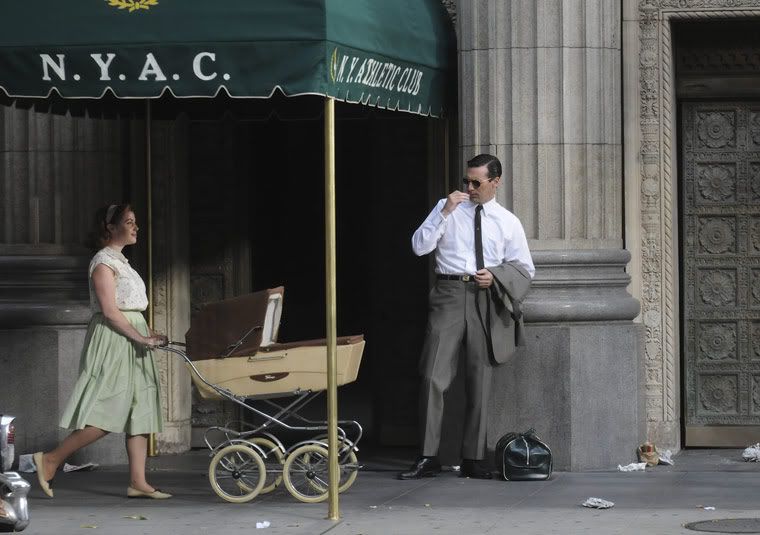
Mad Men is back to wearing it's John Cheever-ness on its sleeve, with Don swimming his way through his demons (see Cheever's short story The Swimmer), and returning to the false utopia of his Ossining life (For those of you playing at home, Cheever spent the majority of his productive years in Ossining, drinking and adultering until death by cancer).
However, like many of Cheever's short stories (see also The Enormous Radio, a personal favorite), The Swimmer features a young man who loses himself or a spouse to the darker undercurrents running through New York suburbs. Which is ironic since, for the first time this season, we're seeing Don try to shape up and course-correct (Which I was a little disappointed by to be honest, I was looking forward to seeing Don's bound-to-be-legendary rock bottom).
Meanwhile Joan takes a big step back. Like Don, the passage of time has made her attempts to assert power seem less cutting and a lot more desperate. Compare Joan's reaction to the vending machine scene to Peggy's in the Xerox scene in season two's "The Mountain King." Joan is struggling with the slow loss of control while Peggy is on a journey of consolidation.
I'm not going to go on too much about Don's inane voiceover, this has been fairly effectively trashed over at Slate. It's also too soon to discuss Dr. Faye Miller; her narrative is not complete, and her role is not yet predictable. But for the first time, we do see what kind of woman might make Don into a better man (apart from Peggy, of course).
It's tempting to dismiss Betty again, as it seems most have all season, but at last we are shown her value to the narrative. She is not as strong a force in Don's life as she once was, but she's still one of the unpredictable currents in his swimming pool.
After I finished writing this post, I stumbled across Natasha Vargas-Cooper's far more extensive discussion of the parallels between this week and The Swimmer. If you're interested, go here: The Footnotes of Mad Men: The Swimmer
Subscribe to:
Comments (Atom)

